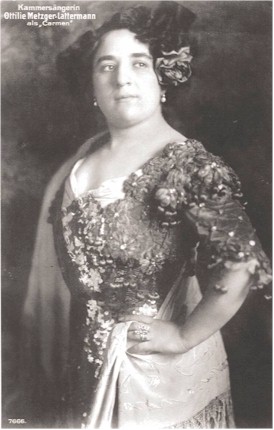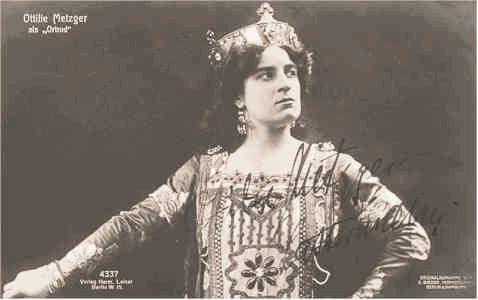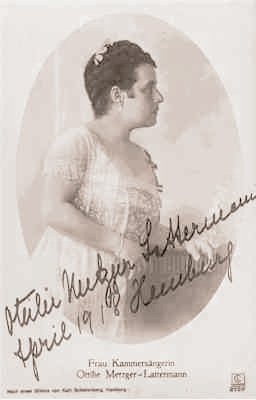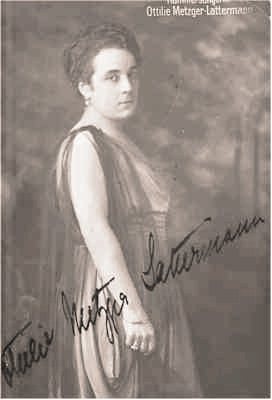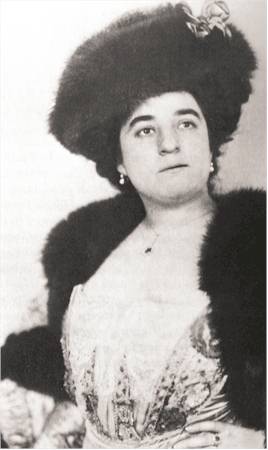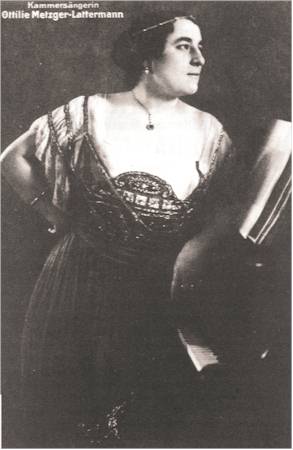Metzger-Lattermann, German contralto (1878 – 1943)
Biographical notes: This splendidly gifted contralto was born in Frankfurt am Main and studied mainly with Selma
Nicklass-Kempner in Berlin. After her debut at Halle in 1898, she was off and running with a career that would take her many places and have her singing many roles. Metzger spent three
years at Cologne before being named the principal contralto at Hamburg; there she sang with many of the greats of her day, including Caruso (in Carmen and Aida) during his guest
appearances. She sang at Bayreuth in 1901, 1902, 1904 and 1912, where she was most noted for her stately interpretations of Waltraute in Götterdämmerung and Erda in Siegfried. Her huge
repertoire also included Dalila, Magdalena in Die Meistersinger, Azucena, assorted Norns and Valkyries in the Ring, Brangäne, both incarnations of Fricka, Klytemnästra in Strauss’ Elektra
and Fidès, to name but a few. At Hamburg, she sang in the premieres of Siegfried Wagner's Bruder Lustig (1905), Blech's Versiegelt (1908) and d’Albert’s Izyel (1909).
Ottilie Metzger also sang at Covent Garden (debut as Magdalena, 1902), where she was the first London Herodias in Strauss’ Salome. Numerous other engagements decorated her long career,
including ones at Berlin, Dresden, Leipzig, Prague, Oslo, Zürich, Amsterdam, Wiesbaden, Vienna, Düsseldorf, Hague and St. Petersburg.
In 1910, Metzger married for the second time, to the bass-baritone Theodor Lattermann, and thereafter used his name in conjuncture with her own. She ventured to America in January 1913,
where she sang as soloist with the New York Philharmonic Orchestra. Metzger-Lattermann was also a distinguished recitalist; at one point her accompanist was none other than Richard Strauss.
In the early 1920s, she toured the United States in Leo Blech’s distinguished German Opera Company (his casts also included Seinemeyer, Alsen,
As Ortrud
(courtesy of Charles B. Mintzer) Recordings: When Ottilie Metzger made her first records, the "gramophone" was still a novelty not always
taken seriously by some of the "serious" vocal artists who were pioneers in the field. It becomes clear almost instantly that Metzger took her records quite seriously, and it is probably fair to
assume we are left with a relatively accurate account of what was heard by her audiences. On records, Metzger displays the sort of otherworldly, deep and compelling voice needed for
Wagner’s earth mothers and all-knowing goddesses. Yet curiously, her most recently re-issued recordings appear on
Her recorded legacy offers her in a variety of music; in a 1910 version of Orfeo’s "Plea to the Furies" (sung in German for Parlophon), her rich, steady voice communicates quite audibly a
deep understanding of the music she sings. From the first act of Verdi’s Un Ballo in Maschera, she recorded two excerpts of Ulrica’s music. These too display Metzger in fine voice and
definitely "in character" as the fortune-teller. Also from Verdi, her towering Amneris delivers a formidable sense of rivalry to Melanie Kurt’s Aida.
Two of Metzger’s earliest records are of Rhinemaiden scenes from Das Rheingold and Götterdämmerung sung with Josefine von Artner and Maria Knüpfer. The voices blend
marvelously, but the impact of the music is lessened somewhat by the impotent piano accompaniments; here, for once, even the "orchestra" sound of the day might have lent some
improvement. But even a piano accompaniment cannot diminish the impact of her Erda from Siegfried. She managed to fit almost all of the scene onto a 1908 disc, the voice once again
firm, the grave message to Wotan extraordinarily compelling. Here, as elsewhere, we are left with vivid documentation of what a gifted "singing actress" Metzger must have been.
(courtesy of Charles B. Mintzer)
(courtesy of Charles B. Mintzer)
Alan Blyth describes her recording of Waltraute’s "Narration" from Götterdämmerung (made in
1910) best: "Her reading has the classical qualities of grave, steady tone, rock-like technique and urgency in delivery of the text… most glorious was Metzger." Most glorious she was indeed.
Comments: The monstrous circumstances of this great artist’s demise defy human imagination. The hideous conditions, the horrendous irony that such a great Wagnerian was murdered by the Wagner-loving Nazis, is emotionally overwhelming. This, of course, is an understatement, but what words, in any language, are sufficient? It is only human nature that almost all who have written about Ottilie Metzger must mention the unthinkable cause of her death, almost to the point of minimizing all else.
"Alles, was ist, endet… Ein düstrer Tag dämmert den Göttern…" ("All that is shall come to an end… a dark day dawns for the Gods") Erda in Das Rheingold
My warmest thanks to George Parous and Charles B. Mintzer
|
|||||||||||||||||
